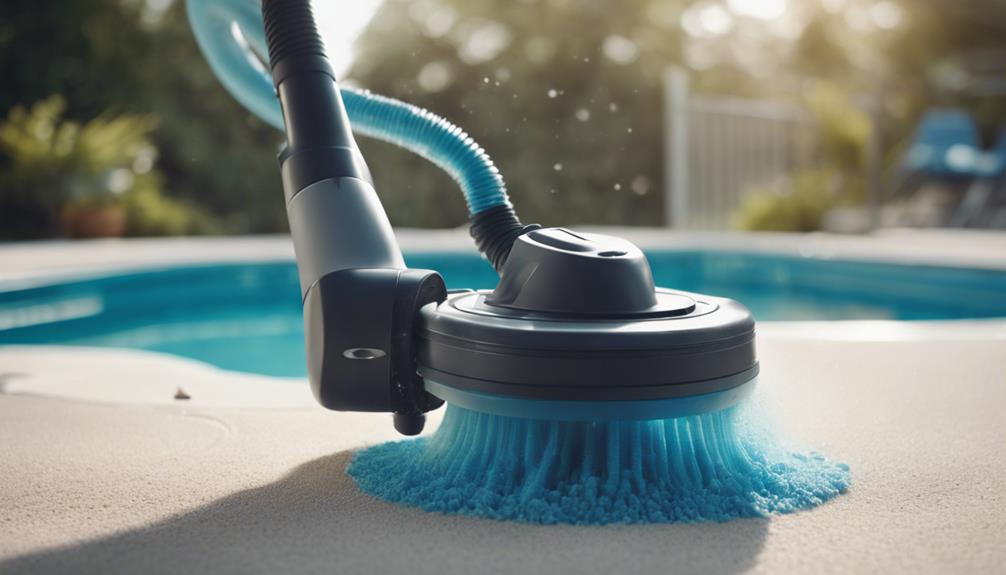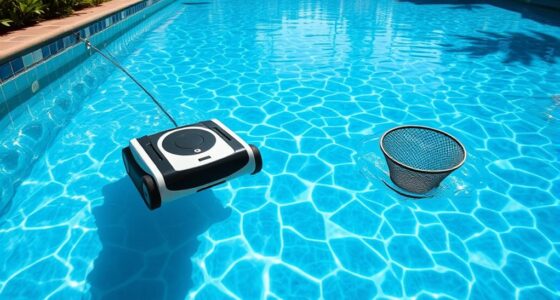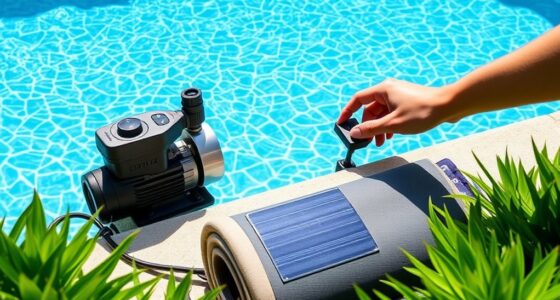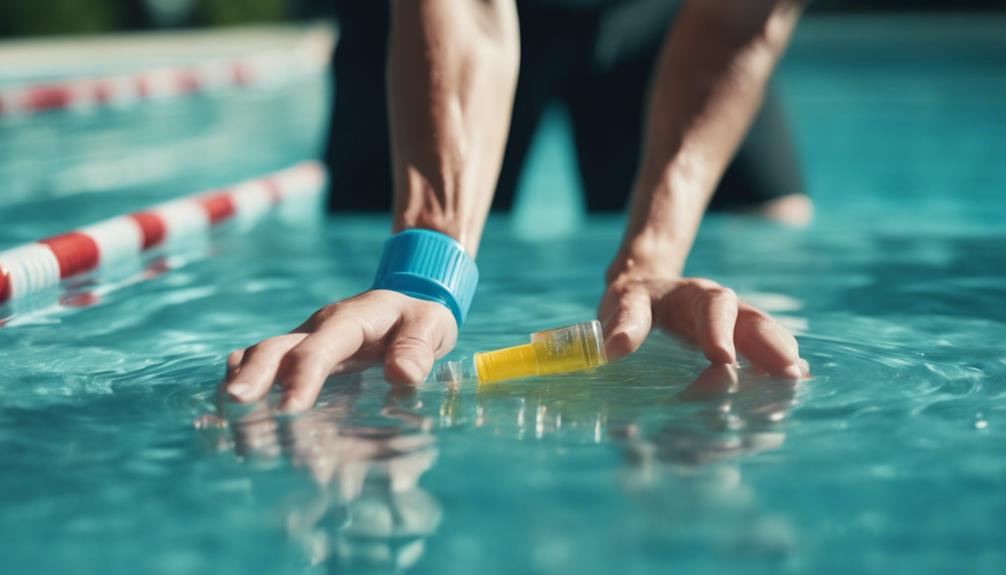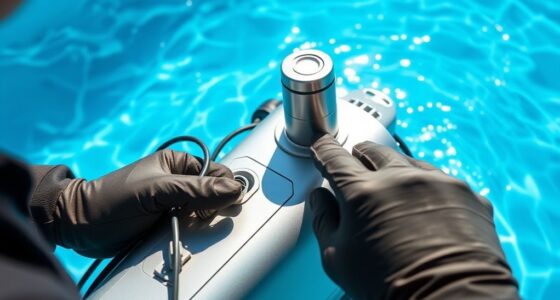In order to maintain your swimming pool in optimal condition, it is important to clean it on a weekly basis. Vacuuming it will help remove dirt, skimming the surface frequently, and testing the pH levels. It is crucial to check the chlorine levels to prevent algae growth and cloudy water. Don’t forget to brush the walls and steps to keep the water crystal clear. It is essential to ensure the water’s chemical balance is correct for a safe swim. Also, remember to regularly check the chlorine levels. By taking care of your pool consistently, you can avoid major issues. There is much more to learn about pool maintenance, so keep in mind what works best for you!
Key Takeaways
- Clean your pool weekly to prevent issues and maintain water quality.
- Vacuum, skim, and brush regularly to keep the pool clean and algae-free.
- Test pH and chlorine levels weekly for safe and clear water.
- Clean pool filters as needed for optimal performance and clarity.
- Monitor chlorine levels frequently to ensure proper sanitation.
Weekly Cleaning Recommendations
For weekly cleaning recommendations, vacuum your pool at least once a week to remove debris and dirt.
Keeping your swimming pool clean is essential for maintaining a sparkling oasis in your backyard. Your pool filter works hard to keep the water clear, but it needs your assistance!
Make sure to empty the skimmer basket weekly so that it can do its job efficiently. Skimming the pool surface regularly will also help in getting rid of leaves and any floating debris, preventing them from sinking and causing a mess.
Testing and adjusting the pH levels weekly is another important step in pool maintenance. This ensures that the water chemistry stays balanced, creating a safe and enjoyable swimming environment.
Additionally, checking chlorine levels weekly is crucial for sanitation purposes. Maintaining these weekly cleaning habits won't only keep your pool in top shape but also make your swimming experience more enjoyable.
Importance of Regular Pool Maintenance

Keeping up with regular pool maintenance is key to a sparkling clean swimming experience. By staying on top of maintenance tasks, you can prevent pesky pool issues from cropping up and causing headaches down the line.
It's a simple way to guarantee your pool remains a safe and enjoyable oasis for you and your loved ones.
Maintenance Frequency
Maintaining your swimming pool regularly is essential for ensuring water quality and a safe swimming environment. Cleaning your pool on a regular basis isn't just about keeping it looking nice; it's vital for keeping the water clean and free of harmful bacteria.
To maintain a pristine pool, make sure to clean it frequently to prevent algae growth and maintain the right chemical balance. Tasks like skimming, vacuuming, and testing the water should be done weekly to guarantee a sparkling clean and safe swimming experience.
Neglecting pool maintenance can lead to serious issues like equipment malfunctions, structural damage, and health risks for swimmers. By sticking to a consistent cleaning schedule, you can streamline the maintenance process and make sure that your pool remains in excellent condition all season long.
Preventing Pool Issues
To keep your swimming pool free from potential issues like algae growth and equipment damage, regular maintenance is imperative. Pool maintenance isn't just about skimming leaves off the surface; it's about ensuring that your pool stays clean, safe, and enjoyable for everyone.
By keeping up with proper chemical balance and preventing algae growth, you can avoid murky waters and slimy walls – yuck! Plus, regular upkeep helps steer clear of equipment damage, which can be a real headache and costly to fix. Nobody wants to deal with a broken pump or filter, right?
When you stay on top of pool maintenance, you're not only preserving the lifespan of your pool but also creating a healthy environment that wards off bacteria and diseases. So, roll up your sleeves, grab that skimmer, and engage in regular maintenance tasks.
Your pool – and everyone who swims in it – will thank you for the effort!
Vacuuming and Skimming Practices
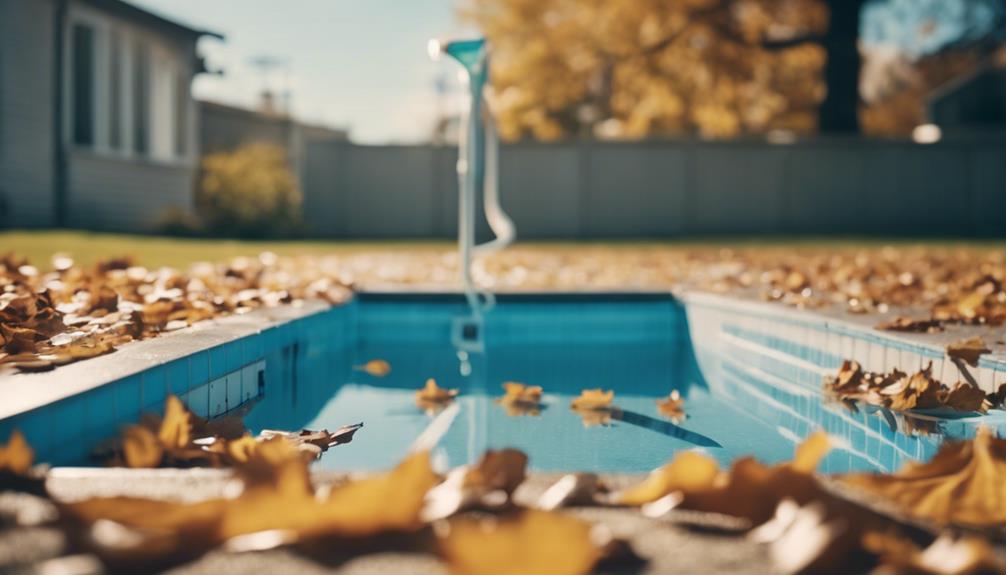
When it comes to keeping your swimming pool sparkling clean, vacuuming and skimming are your best friends. By vacuuming weekly, you can say goodbye to dirt, debris, and pesky algae that try to take over your pool.
Don't forget to skim daily to keep those leaves and insects from crashing the pool party!
Vacuuming Frequency Tips
Keep your pool clean and inviting by vacuuming it at least once a week to remove dirt, debris, and algae buildup. Consistent vacuuming not only helps in maintaining a sparkling pool but also prevents infections, guaranteeing a safe swimming environment.
Here are some tips to help you make the most out of your vacuuming sessions:
- Regular Schedule: Stick to a weekly vacuuming routine to keep your pool free from debris and algae growth.
- Thorough Cleaning: Pay extra attention to the pool walls, steps, and floor while vacuuming to ensure a thorough cleaning process.
- Check Pool Equipment: Before starting, make sure your vacuum equipment is in good condition to efficiently remove dirt and debris.
- Monitor Water Clarity: Keep an eye on the clarity of the pool water. If you notice any issues, consider increasing the frequency of your vacuuming sessions for a crystal-clear pool.
Skimming Best Practices
Make sure to incorporate skimming into your pool maintenance routine alongside regular vacuuming to effectively remove floating debris and maintain a clean swimming environment. Skimming the pool surface daily is essential to prevent contamination and keep your pool looking pristine.
By skimming, you can easily get rid of leaves, insects, and other debris that may have found their way into the water. Pay special attention to skimming around the pool tiles where debris tends to accumulate.
Vacuuming your pool at least once a week complements skimming by eliminating dirt, leaves, and algae buildup from the pool floor and walls. This practice helps maintain water clarity and prevents the clogging of filters.
Cleaning Schedule Recommendations
For ideal pool maintenance, it's recommended to establish a regular cleaning schedule that includes both vacuuming and skimming practices. Here are some cleaning schedule recommendations for keeping your pool sparkling clean:
- Vacuum your pool at least once a week: This helps remove dirt, debris, and algae buildup, guaranteeing your pool stays fresh and inviting.
- Skim the water surface and pool floor regularly: By eliminating leaves and floating particles, you can prevent clogs and maintain clear water for a pleasant swimming experience.
- Brush the walls, steps, and floors: Regular brushing not only prevents algae growth but also helps in maintaining the cleanliness of your pool, making it more enjoyable for everyone.
- Consistent pool maintenance is key: By following a regular maintenance routine that includes vacuuming, skimming, and brushing, you can maintain your pool as a safe and hygienic environment for all swimmers.
Brushing Walls and Steps

To uphold a clean and safe swimming pool, make sure to brush the walls and steps weekly to prevent algae and debris buildup. Regular brushing of your pool's walls and steps not only keeps them looking sparkling clean but also helps in distributing pool chemicals evenly throughout the water. Using a wide brush specifically designed for pool walls ensures thorough cleaning, helping maintain the pool's surface and preventing slippery conditions. By incorporating wall and step brushing into your weekly pool cleaning routine, you are taking proactive steps to ensure ideal maintenance and a more enjoyable swimming experience.
Let's break down why brushing walls and steps is important:
| Benefit | Description | Importance |
|---|---|---|
| Prevent Algae Buildup | Brushing walls and steps removes algae spores, preventing them from growing and spreading in your pool. | Essential for pool cleanliness |
| Remove Debris | Regular brushing eliminates debris, keeping your pool water clear and inviting. | Ensures a pleasant swimming experience |
| Distribute Chemicals | Brushing aids in dispersing pool chemicals evenly, maintaining proper water balance. | Essential for effective chemical treatment |
Maintaining Water Chemistry Balance

Ensuring proper balance of water chemistry in your swimming pool is essential for maintaining a safe and healthy environment for swimmers. Here are some key points to help you keep your pool water in top condition:
- Regularly test pH levels: By checking and adjusting the pH levels of your pool water, you can create a comfortable swimming environment and prevent issues like skin and eye irritation.
- Monitor chlorine levels: Consistently keeping an eye on chlorine levels is vital to ward off harmful bacteria and algae growth, ensuring your pool stays clean and safe for swimming.
- Proper water chemistry maintenance protects your pool: Maintaining the right balance of chemicals not only keeps your pool water safe for swimmers but also helps extend the life of your pool surfaces and equipment.
- Follow professional recommendations: Seeking advice from pool experts and adhering to their guidance on water chemistry maintenance is essential to enjoying a sparkling clean pool all season long.
Proper Pool Filter Cleaning

Regularly maintaining your pool filter is essential for peak performance and water clarity. As pool owners, it's important to keep an eye out for signs like increased pressure or cloudy water, indicating that your filter needs some TLC.
For cartridge filters, give them a rinse with a hose every month and a deep clean every six months. DE filters need backwashing every 4-6 weeks and a thorough cleaning once a year. And don't forget about sand filters – backwash them every 2-4 weeks and change the sand every 5-7 years.
When it comes to cleaning your filter, make sure to use a filter cleaner and degreaser, which can help get rid of built-up gunk and oils. If you're not sure how to clean your specific filter, don't worry! Reach out to your local pool professional for guidance. They've the expertise to make sure your filter is in top shape, keeping your pool water crystal clear for those sunny days ahead.
Monitoring Chlorine Levels

Maintain a chlorine level of 3 ppm in your pool to guarantee proper sanitation and water quality. Monitoring chlorine levels is important for ensuring your pool is clean and safe for swimming.
Here are some essential tips to help you keep track of your chlorine levels effectively:
- Regular Testing: Use a reliable pool water testing kit to check chlorine levels frequently, at least 2-3 times a week.
- Adjust as Needed: After heavy pool usage, rain, or if you've been away for an extended period, adjust the chlorine levels accordingly to maintain water quality.
- Role of Chlorine: Understand that chlorine is essential for pool sanitation as it works to eliminate harmful bacteria and algae, keeping your pool hygienic.
- Preventive Maintenance: Keeping chlorine levels important not only safeguards against waterborne illnesses but also contributes to overall pool hygiene, ensuring a clean and enjoyable swimming experience.
Seasonal Pool Maintenance Considerations

Get your swimming pool ready for the upcoming season with a thorough maintenance checklist to ensure peak functionality and safety for all users.
When it comes to seasonal pool maintenance, making sure that your pool is clean and safe is essential. Start by cleaning out any debris that may have accumulated over the winter months. This includes leaves, twigs, and other foreign objects that could affect the pool's filtration system.
Next, test the pool water regularly to maintain the proper chemical balance. You want to make sure that the water is safe and comfortable for swimming. Additionally, consider exploring chlorine-free alternatives for pool sanitation during the season. These alternatives can be gentler on the skin and eyes while still keeping the water clean.
Remember to address any water bug infestations promptly to prevent damage and implement safety measures to protect your family from unintentional drownings.
Professional Pool Cleaning Services

When it comes to ensuring the long-term cleanliness and functionality of your swimming pool, considering professional pool cleaning services every 2-3 months is a wise investment.
Here's why:
- Expert Care: Professionals are trained to maintain your pool properly, balancing water chemistry, checking filtration systems, and addressing any repair issues efficiently.
- Longevity and Value: Regular servicing by professionals not only keeps your pool pristine but also ensures its durability and preserves its worth over time.
- Filters and Remove Debris: Professionals know how to clean filters and remove debris effectively, keeping your pool in excellent condition for you to enjoy.
- Maintenance and Cleaning: Seasonal changes and weather conditions can impact your pool, making professional maintenance essential to adapt and keep it in prime swimming shape.
Frequently Asked Questions
How Often Does a Swimming Pool Need to Be Cleaned?
Alright, let's jump right in!
Your swimming pool should get a good scrubbing about once a week. This helps kick out debris and keeps the water in excellent condition. By giving it regular TLC, you can ward off pesky algae, nasty bacteria, and any health risks.
Adjusting those pool chemicals, skimming the surface, and giving it a good vacuum are key routines for keeping your pool sparkling clean and ready for a splashin' good time!
Do You Have to Clean Your Pool Every Day?
Do you have to clean your pool every day?
Well, not necessarily, but doing a bit of tidying up daily makes a big splash in the long run. Skimming off debris and checking chlorine levels keeps things swim-ready.
And get this, regular maintenance cuts down on the need for bigger clean-ups and fixes later on.
What Regular Maintenance Should Be Done on a Pool?
Regular pool maintenance involves daily tasks like skimming debris and emptying the skimmer basket.
Don't forget to vacuum weekly to keep dirt and algae at bay.
Test pH and chlorine levels every week for balanced water chemistry.
Clean the pool filter regularly based on usage to make sure it's working well.
Stay on track with a cleaning schedule to guarantee your swimming pool stays clean and safe for everyone to enjoy!
How Often Should a Pool Guy Come Out?
Like a trusty sidekick, your pool guy should swing by every 1-2 weeks for maintenance. Factors like how much you splash around, the weather, and water balance can tweak this schedule.
These visits keep your pool free from pesky algae, wonky pH levels, and equipment hiccups. With regular TLC from a pro, your pool will stay sparkling, safe, and running smoothly year-round.
Chat with your pool service provider to nail down the perfect maintenance plan for your pool!
Is Draining the Swimming Pool Necessary for Regular Cleaning?
The draining swimming pool frequency depends on the level of maintenance required. Regular cleaning through filtration and chemical treatment can significantly reduce the need for complete draining. However, periodic draining may still be necessary to remove buildup and maintain water quality.
Conclusion
So, how often should you clean your swimming pool?
Well, weekly maintenance is key to keeping your pool crystal clear and swim-ready. Remember to vacuum, skim, brush, and test your water chemistry regularly.
Don't forget to clean your pool filter and monitor chlorine levels for a safe swimming experience.
And if all else fails, consider hiring a professional pool cleaning service to take the hassle off your hands.
Happy swimming!


